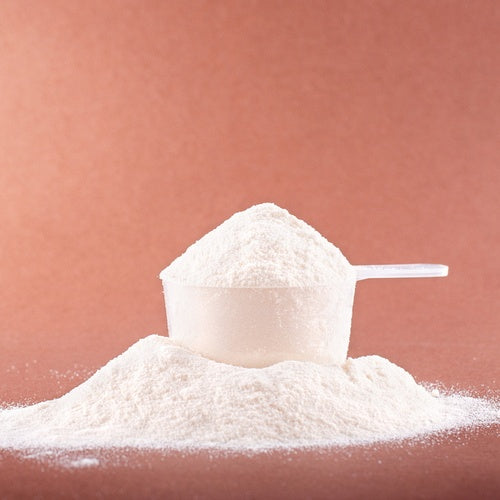Introduction
When it comes to gut health, we hear a lot about gut wall permeability, otherwise known as leaky gut. We also hear a lot about our gut microbiome, that is, the ecosystem of good and bad bacteria in our intestines. But one critical component of our gut health that is commonly overlooked is our digestive enzymes.
You could be eating all the right foods, loading up on optimal vitamins and minerals, the best fats and proteins and nutrient-dense vegetables. But if you don’t have enough digestive enzymes or if they’re not working properly, you may still be not getting enough nutrients as you won’t be absorbing them from your food.
What are Digestive Enzymes and Why are they Important?
Digestive enzymes are proteins that your body produces to control chemical reactions. They speed up the breakdown of food into their building blocks e.g. protein is broken down into amino acids. Your pancreas, stomach, salivary glands and the brush border of your small intestine all release enzymes that aid in breaking down your food into nutrients it can absorb so that it can be transported to the liver and from there to other parts of the body. Digestive enzymes also protect your gut by breaking down inflammatory compounds such as lectins which are a major contributing factor to leaky gut.
Digestive enzymes are essential for digestion but their functions and benefits do not end there. Over 3000 different enzymes have been identified in the human body although some people claim that we may have anywhere from 50,000 to 70,000 enzymes that regulate your every metabolic function such as boosting endurance and increasing nutrient intake to treat cancer. Supplementation of digestive enzymes have also been extensively used to treat metabolic disorders, obesity, diabetes or intestinal disorders and inflammation.
There are eight primary digestive enzymes, each designed to help break down different types of food:
- Protease: digesting protein
- Maltase: converting complex sugars from grains into glucose
- Amylase: digesting carbohydrates
- Lactase: digesting milk sugar (lactose) in dairy products. As you age, your body’s production of lactase declines and hence, so does your ability to digest dairy.
- Lipase: digesting fats
- Phytase: helps with overall digestion, especially in producing the B vitamins
- Cellulase: breaking down fiber
- Sucrase: digesting most sugars

How Do they Work?
The process of absorption starts in the mouth when we begin to chew our food. Your saliva contains amylase and lipase enzyme that begin to break down starches and carbohydrates, and fats respectively. The process continues in the stomach where it is important to have enough hydrochloric acid and protease (pepsin) to begin to break down proteins. A big player in this process is the pancreas which supplies pancreatic enzymes in the form of protease (trypsin) to break down proteins into amino acids, lipase to break down fats into fatty acids and amylase to breakdown carbohydrates into simple sugars like glucose and fructose.
Your intestines contain even more enzymes including peptides which continue the process of breaking down protein and carbohydrate specific enzymes such as sucrase, lactase and maltase. The liver also produces and releases bile which breaks down fats into fatty acids.
What causes Low Enzymes?
There are many different factors that can inhibit digestive enzyme production and cause a low digestive enzyme count ranging from more common causes to more rare serious conditions. Pancreatitis, coeliac disease and Inflammatory Bowel Disease can all destroy enzyme production, meaning you won’t be able to properly absorb your nutrients, and further exacerbating the disease.
Common causes of low digestive enzymes include:
-
Inflammation
Inflammation causes the brush border to be disturbed and impacts the pancreas’ ability to produce the enzymes. Drivers of inflammation include food intolerances and leaky gut, bacterial overgrowth, candida infection and Helicobacter pylori, a type of bacteria that resides in the lining of your stomach and can cause even more serious conditions such as stomach ulcers and stomach cancer.
-
Ageing
Your body naturally produces fewer digestive enzymes as you age.
-
Low Stomach Acid
Low levels of stomach acid and pepsin will also lead to low pancreatic enzymes as they help to stimulate the pancreas to release digestive enzymes.
-
Stress
High stress reduces the energy it uses for digestion as it sends the body from a para-sympathetic state to a sympathetic state i.e. “fight or flight” mode. The body then focuses its attention elsewhere other than your digestive system as the stressor becomes top priority, impacting digestive enzyme production.
-
Taking Antacids (Stomach Acidity Neutralization Aids)
Taking antacids (stomach acidity neutralization aids) can inactivate proteases by raising the pH in the stomach.
As different probiotics have different actions in the body, it is important to make sure you have the right balance of good guys and to use a strain that is specific for your individual needs. The right strain will help replenish and grow your own unique strains of bacteria that are living inside you. Take note, next time you’re looking for a good probiotic to buy, that a good quality one will always include the strain it contains.
Symptoms of Low Digestive Enzymes
It is possible to have low digestive enzymes but not experience any symptoms. More often than not however, when your body is lacking in enzymes, food won’t be broken down leading to symptoms such as:
- Gas and bloating after meals
- Feeling full after eating only a few mouthfuls
- Reflux, burping and nausea
- A heavy feeling lasting up for hours after you eat- as if you have a rock sitting in the bottom of your stomach
- Indigested food in stools
- Loose stools or even diarrhoea or on the other side of the scale, constipation
- Nutritional deficiencies leading to fatigue
Enzyme deficiencies can be hard to diagnose as they often share similar symptoms with other digestive issues such as Small Intestinal Bacterial Overgrowth (SIBO) and Irritable Bowel Syndrome (IBS). They often also occur simultaneously. Stool tests can be performed to provide a comprehensive picture of your enzyme health as well as other digestive markers.

Digestive Enzyme Supplementation
Digestive enzyme supplementation can help out when your enzymes are low or to target a specific deficiency. Choosing the right enzyme supplement for you can be overwhelming as there are so many. There are no one-size fits all answers for enzymes and different combinations and dosages may work for different people.
Enzyme supplements can be grouped into three categories by their source: animal, plant or sourced such as sourced from fungi. Animal-derived enzymes (usually pancreatic products from pigs) are broad-spectrum and potent but they tend to be less shelf-stable and can be difficult for people to tolerate with more sensitive immune systems. Plant-based enzymes such as bromelain or papain may not be as broad-spectrum, but they tend to be more affordable and more shelf-stable. It’s important to avoid brands with fillers or artificial agents.
Specific enzymes target specific foods, so the first step would be to identify which foods you struggle to digest. A combination supplement with a blend of multiple digestive enzymes is often the best way to address low enzyme production. Some of the common digestive enzymes and the foods they help target are:
- Cellulase: cellulose in fiber-rich plants
- Lipase: fats and oils
- Protease: proteins
- Peptidase: certain proteins such as gluten or casein
- Alpha-galactosidase: starches in legumes
- Pectinase: pectin in fruits
- Amylase: starches
- Glucoamylase: maltose sugar
- Invertase: sucrose sugar
- Lactase: lactose sugar from dairy
It’s best to take enzyme supplements directly before or with a meal.
How to Increase your Digestive Enzymes
While supplements can help to provide the necessary digestive enzymes, there are some very simple diet and lifestyle changes that you can make to help stimulate your body’s own production of digestive enzymes. So if you resonate with any of the symptoms of low digestive enzymes, try some of these helpful tips and suggestions:
-
Chew your food
How you eat is just as important as what you eat. While it may seem like too simple a suggestion, it is something that many people forget in their busy lifestyles or while they eat their meals in front of the television. Thoroughly chewing your food helps with the physical breakdown of food. It also stimulates messages from your brain to your stomach to start producing stomach acid and pepsin which in turn stimulates your pancreas to start producing digestive enzymes. Aim to chew your food twenty times per mouthful or until it is pureed.
-
Avoid drinking during meals
Try to avoid consuming large amounts of liquid twenty minutes before and after your meals as this will dilute your digestive secretions and render them less effective.
-
Ensure there is a mix of nutrient-dense raw and cooked food in your diet
Diet is key when it comes to increasing your digestive enzymes. Not only do you need to eat a nutrient dense diet to ensure you are getting the right nutrients your body needs to produce your digestive enzymes, it’s also good to eat a balance of raw and cooked food. Some raw foods which are rich in digestive enzymes include papaya, pineapple, kiwi, avocado, banana and fermented foods.
-
Eat adequate amounts of protein and zinc-rich foods
In order to make enzymes, our body needs quite a few building blocks and the two main ones are protein and zinc. Some good plant-based sources of protein include quinoa, legumes, nuts and seeds. A good rule of thumb is to aim for a palm-sized portion of protein at each meal. Zinc is required to help your body manage stress and it’s also involved in countless other biochemical reactions in the body. Some great plant-based foods rich in zinc include nuts and seeds (especially brazil nuts, almonds, cashews, peanuts, pine nuts, walnuts, sesame seeds, chia seeds, pumpkin and sunflower seeds), vegetables (such as sundried tomatoes, green peas, garlic, spinach and mushrooms), quinoa and legumes (especially chickpeas and soybeans).
-
Eat bitter foods
Eat the leaves of bitter herbs that promote digestion including dandelion leaves, rocket and peppermint as this will help to stimulate digestive enzyme secretion.
-
Address food intolerances
Food intolerances can cause inflammation and affect the production of your digestive enzymes. They vary from person to person but some of the common culprits include gluten, dairy, eggs and fructose and eliminating them for a few weeks can help you to identify if you react to them.
-
Try fasting
Try not to snack between meals or try intermittent fasting such as the 5:2 diet or the 16:8 diet. When your body is in a state of fasting, your gastric acid triggers the intermittent release of secretin (a hormone) that stimulates your liver and pancreas.
-
Reduce your stress
When presented with a potentially threatening situation, your body’s sympathetic nervous system kicks in by triggering a “fight or flight” response, releasing cortisol to make the body alert and able to respond quickly to the threat. Your body makes facing the stressor its priority and puts it other needs on hold. This includes digestion and this is why, when you are stressed, your body tends to slow down and decrease its production of digestive enzymes. It becomes a real problem when the stress is prolonged as digestion becomes increasingly impaired. So you can see it’s very important to learn some stress management tips you can implement a few minutes per day to help reduce this “fight or flight” response. Exercising, deep breathing and meditation techniques and getting out in nature are some great ways to reduce stress.













What Do You Think? Comment Below: